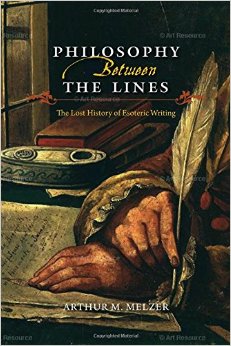Ricochet is the best place on the internet to discuss the issues of the day, either through commenting on posts or writing your own for our active and dynamic community in a fully moderated environment. In addition, the Ricochet Audio Network offers over 50 original podcasts with new episodes released every day.
 Books as Christmas Gifts: Philosophy Between the Lines
Books as Christmas Gifts: Philosophy Between the Lines
 Twenty-four years ago, I made an attempt in Republics Ancient and Modern to collect all of the passages from the post-Machiavellian literature in which figures of some importance in early modern political thought openly discussed the manner in which the habitually conveyed one thing on the surface of their arguments while hinting at the opposite in what they conveyed between the lines. It was my conviction — and still is — that a fair proportion of the great figures in early modern political thought — Machiavelli, for example; Sir Francis Bacon; Thomas Hobbes; and the like — were barely concealed atheists. And I wanted to provide sufficient evidence from a host of sources for discounting the occasional pious pronouncement in which these figures indulged.
Twenty-four years ago, I made an attempt in Republics Ancient and Modern to collect all of the passages from the post-Machiavellian literature in which figures of some importance in early modern political thought openly discussed the manner in which the habitually conveyed one thing on the surface of their arguments while hinting at the opposite in what they conveyed between the lines. It was my conviction — and still is — that a fair proportion of the great figures in early modern political thought — Machiavelli, for example; Sir Francis Bacon; Thomas Hobbes; and the like — were barely concealed atheists. And I wanted to provide sufficient evidence from a host of sources for discounting the occasional pious pronouncement in which these figures indulged.
Arthur Melzer, in his book Philosophy Between the Lines: The Lost History of Esoteric Writing, picks up where I left off and goes much farther. He attempts to collect all of the evidence for esoteric writing and then to examine the reasons why great thinkers resorted to this species of subterfuge.
This is a vitally important subject, and it helps explain why it is so easy to adopt the historicist stance and to say of past thinkers that they were men of their time and that they thought only the thoughts that were conventional in that time. As Arthur makes clear, it is perfectly true that in what they wrote and said these thinkers frequently had to conform or thought it prudent to do so. But it is a big mistake to suppose that they were incapable of thinking outside the box and never really did so. If, by chance, you are yourself inclined to subscribe to the historicist thesis or know someone well who does, you should buy and read this book or buy it and give it to your friend. For many, it will be an eye-opener.
Published in Literature



I read Melzer’s book, one among many, on deployment earlier this year. This book takes just the right tone toward the subject for an introductory volume: if you’ve never heard these arguments before, Melzer explains them; if you are skeptical of these arguments, Melzer embraces your skepticism and goes to great pains to provide evidence. If you are long familiar with these arguments and have encountered them again and again in your own reading of old things, then Melzer’s book contains a passage or two you’d nearly forgotten and recalls it to your mind in a new and energizing light.
In short: well worth having in your library or providing as a part of a new, doubtless very different, kind of semiotics curriculum to free a student from the biases they have adopted from the dominant schools of our day.